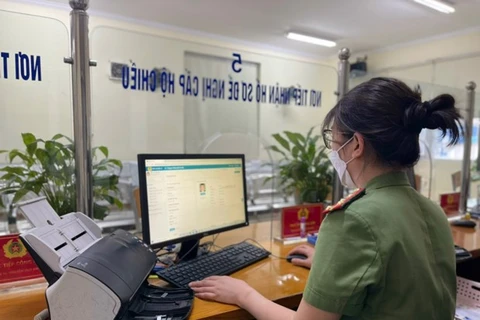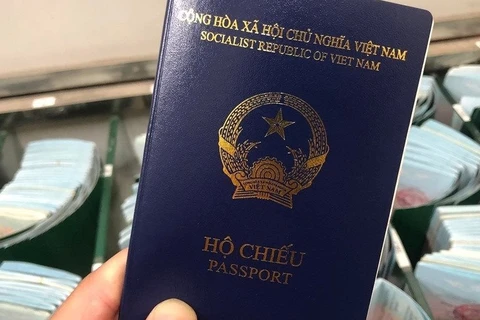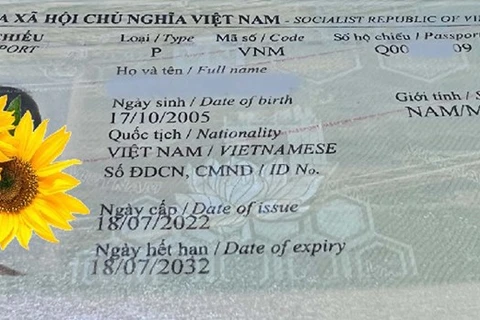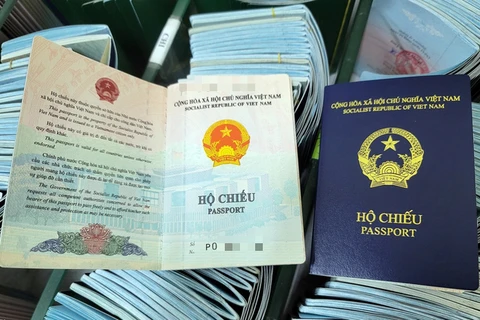Hanoi (VNA) – The Czech Republic has declared to not recognise Vietnam’s new passports, becoming the third country, all in Europe, to do so.
“Vietnam’s new passports, which were issued from July 1, 2022 do not meet technical standards of the International Civil Aviation Organisation (ICAO),” the Czech Embassy in Vietnam said in a statement on its official website on August 2. “Therefore, the Czech Republic agrees with other European Union (EU) member countries to stop recognising its validity.”
The decision took effect from the time of notification, the embassy said, but did not specify the standards as prescribed by the ICAO that Vietnam’s new passports have not met.
The other two European countries rejecting Vietnam’s new passports are Germany and Spain.
In separate announcements, both Embassies of Germany and Spain in Vietnam said the reason for the non-recognition of the new navy blue-coloured passports because they do not have a place of birth (province/city) listed.
This can make it difficult for the German side to identify the specific locality where Vietnamese citizens were born, especially in the case of minors where ID number has not been granted, the Embassy of Germany said on July 27.
It noted the Vietnamese holders of the new passports who have already received visas to Germany should refrain from travelling since they would be denied entry at the border.
The Embassy of Spain in Vietnam described the place of birth of passport holders as an important information for personal identification, which is also required for processing Schengen visa applications.
Current regulations do not allow the issuance of a Schengen visa to Vietnamese nationals holding the new passports, the embassy announced on August 1.
Currently, the Spanish authorities, in collaboration with other Schengen member states, are conducting technical analysis.
The Ministry of Foreign Affairs’ Consular Department is working with the Ministry of Public Security’s Vietnam Immigration Department to exchange information and seek solutions. The Consul Department has asked the German Embassy in Hanoi for cooperation to jointly find ways to facilitate Vietnamese nationals’ entry in Germany, in line with the two countries’ Strategic Partnership.
At the same time, the Embassy of Vietnam in Germany has said it stands ready to provide written confirmation on the place of birth that can be tagged along with the new passports./.
“Vietnam’s new passports, which were issued from July 1, 2022 do not meet technical standards of the International Civil Aviation Organisation (ICAO),” the Czech Embassy in Vietnam said in a statement on its official website on August 2. “Therefore, the Czech Republic agrees with other European Union (EU) member countries to stop recognising its validity.”
The decision took effect from the time of notification, the embassy said, but did not specify the standards as prescribed by the ICAO that Vietnam’s new passports have not met.
The other two European countries rejecting Vietnam’s new passports are Germany and Spain.
In separate announcements, both Embassies of Germany and Spain in Vietnam said the reason for the non-recognition of the new navy blue-coloured passports because they do not have a place of birth (province/city) listed.
This can make it difficult for the German side to identify the specific locality where Vietnamese citizens were born, especially in the case of minors where ID number has not been granted, the Embassy of Germany said on July 27.
It noted the Vietnamese holders of the new passports who have already received visas to Germany should refrain from travelling since they would be denied entry at the border.
The Embassy of Spain in Vietnam described the place of birth of passport holders as an important information for personal identification, which is also required for processing Schengen visa applications.
Current regulations do not allow the issuance of a Schengen visa to Vietnamese nationals holding the new passports, the embassy announced on August 1.
Currently, the Spanish authorities, in collaboration with other Schengen member states, are conducting technical analysis.
The Ministry of Foreign Affairs’ Consular Department is working with the Ministry of Public Security’s Vietnam Immigration Department to exchange information and seek solutions. The Consul Department has asked the German Embassy in Hanoi for cooperation to jointly find ways to facilitate Vietnamese nationals’ entry in Germany, in line with the two countries’ Strategic Partnership.
At the same time, the Embassy of Vietnam in Germany has said it stands ready to provide written confirmation on the place of birth that can be tagged along with the new passports./.
VNA
























